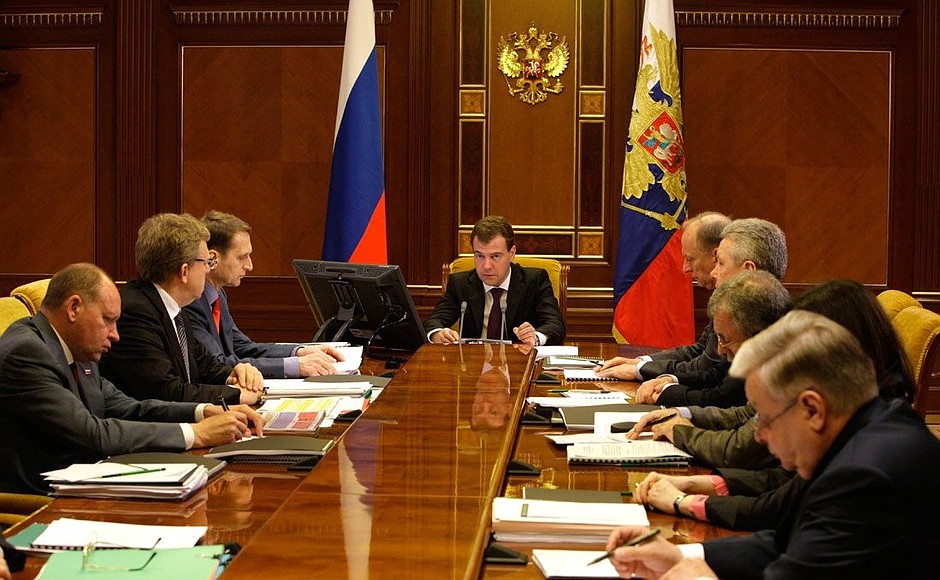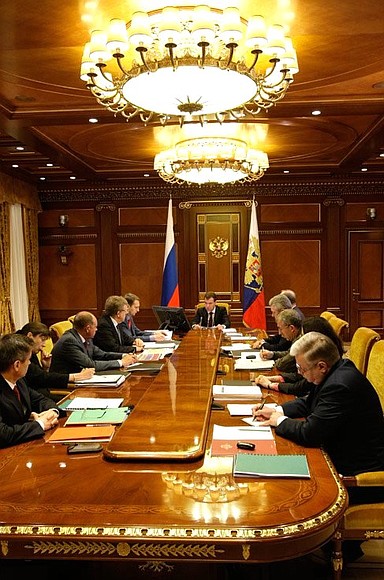The President said that raising Interior Ministry personnel’s social status must go hand in hand with improvements in the quality of their work.
The President noted that reforming the Interior Ministry will require substantial federal budget funds, but said that financial requirements must be justified and in keeping with the budget’s parameters.
Mr Medvedev also cited the need for permanent monitoring at state and public level of the police force’s activities.
* * *
President of Russia Dmitry Medvedev: We agreed to meet regularly to discuss how the work to reform the Interior Ministry is going. This issue is not perhaps quite so much in the public eye as it was a little while back, but this is no excuse to relax and imagine that all the transformations are now complete. They are only just beginning. I am therefore keeping this matter under my personal control. The minister knows this and we discuss this issue regularly.
Our task is to have a police force composed of professional and honest people who protect our citizens’ rights and interests. This is the police force’s main job. Everything else is secondary. The majority of police officers are just such people. Of course, we all take notice whenever police officers commit offences, but the majority of them are professionals who work hard to serve our citizens. Some of my own friends have been working in the Interior Ministry for 25 years or so now, and they are true professionals.
As you know, I issued a number of executive orders last December and this February outlining the reforms to be carried out at the Interior Ministry. I also sent to the State Duma some draft laws aimed at improving the work of the investigative bodies and rules concerning service within the Interior Ministry.
I also proposed amendments to the Criminal Code toughening penalties imposed on law enforcement personnel, including police officers, who commit crimes. In other words, for a police officer who commits a crime, service in the police force is justification for imposing a tougher penalty. These draft laws were passed in the first reading in April. I hope there will be no delays in their passage. I address this hope to our lawmakers.
Of course, it is very important to put in place a fully developed legal foundation. It is essential to delimit the Interior Ministry’s powers and missions from those of other agencies. This is a big issue and we are working on it, and held a meeting on the matter not so long ago.
I remind you that I instructed the Government to prepare a new draft of the law on the police force by December 1. I expect a report very soon on how this work is going, what has been done so far, and what proposals there are, because some ideas could give rise to a certain amount of debate and will require timely action on our part.
Ensuring the ministry’s material support, wages for all personnel, and social benefits for staff remain one of our top priorities. There is no need to tell you that wages and social benefits must be decent and competitive, otherwise it will be hard to hold onto professionals, and of course we will not be able to give our police force the required prestige.
Current wages and pensions for police officers do not match the scale and complexity of the job they are expected to perform. Carrying out reform will require substantial money from the federal budget. These are matters we need to examine separately, and this is why we are meeting in this format today.
We need to have a clear picture of how much we need to spend and on what, and of what we can actually afford in the current situation when putting the budget together is not such an easy task. Spending demands must be justified, properly coordinated with the government officials responsible for economic matters, and have to be in keeping with the budget parameters for the next three years.
Organisational and personnel reforms are another very important area of work. I remind you that we plan to cut the number of Interior Ministry personnel by 20 percent by 2012, in accordance with the executive order. But along with raising the social status of Interior Ministry personnel we also need to raise the quality of their work. You know the tasks to be tackled.
Of course, the level of professionalism among Interior Ministry personnel, and their level of motivation to work properly and honestly are what will determine their overall performance and the microclimate in the ministry. This is not an easy task and we know it cannot all happen overnight, but it is something we must work on steadily and consistently. I expect the ministry’s heads and the Government to give this their utmost attention.
Finally, we need to develop a system for monitoring the Interior Ministry’s activities. We need a system of state supervision and of public monitoring too, which is no less important and which is something that our citizens are more than willing to take part in. This is also a matter that requires our utmost attention.

